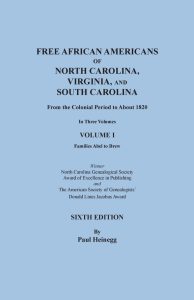NOTE: THIS WEBSITE IS A WORK IN PROGRESS. RESOURCES AND DATA ARE ADDED DAILY.
IMPORTANT: We are in urgent need of funding to keep this project alive and ensure its future. If you’re enjoying the site and see our vision for the project, please consider joining as a paid member or contributing to our crowdfunding campaign today. It is only with your help that we can continue this work.
Thanks so much for your support! – Jes
![]()
0
Free African Americans of North Carolina, Virginia, and South Carolina, From the Colonial Period to About 1820, Vol. I
Resource ID: 28256
Type: book, non-fiction
share:
Some buttons on this page link to external websites. If you visit one of our affiliate sites and make a purchase, I may receive a small commission at no extra cost to you. More info
- UPDATED: 5.24.2025
- status: high-priority, in progress
- Peoples, Regional
- Free Persons of Color, colonial America
author:
editor:
n/a
publisher:
date:
8.10.2021
ISBN:
9780806359298
pages:
596
notes:
contents:
description:
Volume I contains the families alphabetically from Abel to Drew, and contains its own index. Published in three volumes, and 400 pages longer than the Fifth Edition, this work consists of detailed genealogies of hundreds of free Black families who originated in Virginia and migrated to North and/or South Carolina from the colonial period to about 1820. The families represent nearly all African Americans who were free during the colonial period in Virginia and North Carolina. More than 13,000 African Americans are contained in these genealogies. This edition traces many families back to their 17th- and 18th-century roots. Mr. Heinegg dispels a number of myths about the origins and status of free African Americans and demonstrates conclusively that many free African American families in colonial North Carolina and Virginia were landowners. Mr. Heinegg researched in some 1,000 manuscript volumes, including colonial and early national period tax records, colonial parish registers, 1790-1810 census records, wills, deeds, Free Negro Registers, marriage bonds, Revolutionary pension files, newspapers, and more. The author furnishes copious documentation for his findings and an extensive bibliography of primary and secondary sources.
places:
peoples:
CMOS:
author-date:

